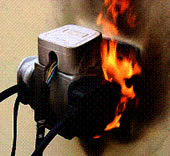Sunday, December 9, 2007
What are the dangers of short circuit and overload?
The dangers of short circuit are it can cause fires which can damage things and will even caused lives. It can cause so much trouble to the family and community. It will destroy appliances in the house and will ruin properties because of the fire it caused.We should really try our best to avoid short circuit and overload by maintainig our appliances at constant state and provide it a better care so that in the end we will not suffer the consequences of it.rest of the network and potentially causes circuit damage, overheating, fire or explosion. Although usually the result of a fault, there are cases where short circuits are caused intentionally, for example, for the purpose of voltage-sensing crowbar circuit protector.
Why will too many electrical devices operating at one time often blow a fuse?
Too many electrical devices operating at one time often blow a fuse because too much current flow can lead to excessive heating of the wire. Fuses have the essential component which is a metal wire or strip that melts when too much current flows. For this reason, a fuse will blow out if too much current flows through it.
Fuses blow quickly for massive overloads, like AC shorts to a grounded chassis. They blow with a some time lag - maybe only a second or two, up to minutes, as the overcurrent gets closer to the fuse's actual rating. Anything that uses enough power to cause the AC line current to exceed the rating of the fuse will eventually cause it to blow.
It is important to remember that a fuse NEVER blows without something else being wrong. It could be that:
fuse is the wrong rating - replace it with the correct rating
power tube shorted
rectifier tube shorted
power supply filter cap failing
Carbon trails on the output tube sockets between the plate lug and the other electrodes, especially the heater electrodes.
power tubes have lost bias or biased incorrectly
power section of the amp is oscillating at too high a frequency to hear
there is an ac wiring short or high leakage
power transformer is faulty
choke (if present) is shorted/leaking to chassis
When is there an overload in a circuit?
Overload happens in a situation where the wiring to or within a machine or system is subjected to a greater electric current load than it was designed to carry, leading to excessive heating of the wires and a possibility of fire. This excessive current load can be a result of electrical insulation failure ( a short circuit) or human error. A correctly designed electrical system incorporates suitable overload protection devices to prevent damage should such a situation occur. Fuses and circuit breakers are most commonly employed for this purpose.
Here are some pictures about overload and its cause:
3. How do Circuit breakers Work?
The circuit breaker- is an absolutely essential device in the modern world, and one of the most important safety mechanisms in your home. Whenever electrical wiring in a building has too much current flowing through it, these simple machines cut the power until somebody can fix the problem. Without circuit breakers (or the alternative, fuses), household electricity would be impractical because of the potential for fires and other mayhem resulting from simple wiring problems and equipment failures.
Circuit breakers are designed to trip (fuses in your fuse box are designed to blow) and turn off power when any of the following dangerous situations occur:
A circuit breaker is an automatically-operated electrical switch designed to protect an electrical circuit from damage caused by overload or short circuit. Unlike a fuse, which operates once and then has to be replaced, a circuit breaker can be reset (either manually or automatically) to resume normal operation. Circuit breakers are made in varying sizes, from small devices that protect an individual household appliance up to large switchgear designed to protect high voltage circuits feeding an entire city.
Subscribe to:
Comments (Atom)

























